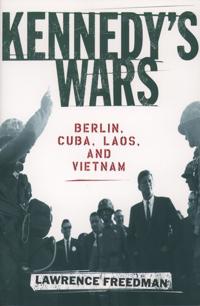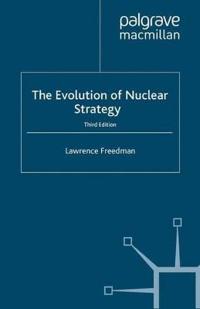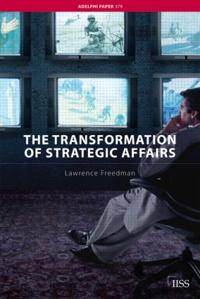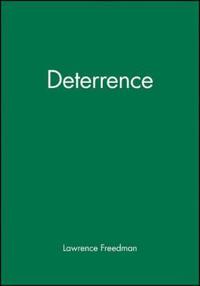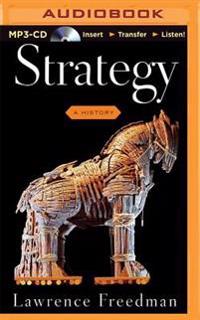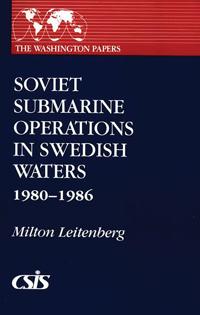Kennedy's Wars (Storpocket)
avLawrence Freedman
ISBN: 9780195152432 - UTGIVEN: 2002-04In his thousand-day presidency, John F. Kennedy led America throuh one of its most difficult and potentially explosive areas. With the Cold War at its height and the threat of communist advances in Europe and the Third World, Kennedy had the unenviable task of maintaining US solidarity without leadi[...]
Into the Desert (Inbunden)
avJeffrey A. Engel, Ryan C. Crocker, Lawrence Freedman
ISBN: 9780199796281 - UTGIVEN: 201212In the decade following the first Gulf War, most observers regarded it as an exemplary effort by the international community to lawfully and forcefully hold a regional aggressor in check. Interpretations have changed with the times. The Gulf War led to the stationing of US troops in Saudi Arabia, a[...]
The Evolution of Nuclear Strategy (Häftad)
avLawrence Freedman
ISBN: 9780333972397 - UTGIVEN: 200303First published twenty years ago, Lawrence Freedman's Evolution of Nuclear Strategy was immediately acclaimed as a seminal work on the history of attempts to cope militarily and politically with the terrible destructive power of nuclear weapons. This new edition takes the story beyond the end of th[...]
Transformation of Strategic Affairs (Pocket)
avLawrence Freedman
ISBN: 9780415407243 - UTGIVEN: 2006-10This book analyzes the strategic implications of the shift in focus for the US Armed Forces from regular to irregular war. Lawrence Freedman closely examines the difficulty the US Armed Forces face in shifting their focus from preparing for regular wars, in which combat is separated from civil socie[...]
The Official History Of The Falklands Campaign (Pocket)
avLawrence Freedman
ISBN: 9780415419116 - UTGIVEN: 2007-06-28After the shock of the Argentine invasion of the Falklands in April 1982, Margaret Thatcher faced the crisis that came to define her premiership as she determined to recover the islands. This book covers various aspects of the campaign - economic and diplomatic as well as military - demonstrating th[...]
The Official History Of The Falklands Campaign (Pocket)
avLawrence Freedman
ISBN: 9780415419123 - UTGIVEN: 2007-06-28Covering the origins of the 1982 war, this book describes the long history of the dispute between Argentina and Britain over the sovereignty of the islands, and the difficulties faced by governments in finding a way to reconcile the dispute.[...]
Deterrence (Häftad)
avLawrence Freedman
ISBN: 9780745631134 - UTGIVEN: 200405As a concept, deterrence has launched a thousand books and articles. It has dominated Western strategic thinking for more than four decades. In this important and groundbreaking new book, Lawrence Freedman develops a distinctive approach to the evaluation of deterrence as both a state of mind and a [...]
A Choice of Enemies (Storpocket)
avLawrence Freedman
ISBN: 9780753825884 - UTGIVEN: 200907The United States is locked into three prolonged conflicts without much hope of early resolution. Iran is pursuing a nuclear programme; the aftermath of the overthrow of Saddam Hussein has seen unrelenting intercommunal violence; and the Taliban have got back into Afghanistan. Lawrence Freedman teas[...]
Strategy: A History (Övrigt)
avLawrence Freedman
ISBN: 9781501227721 - UTGIVEN: 2015-04In "Strategy: A History," Sir Lawrence Freedman, one of the world's leading authorities on war and international politics, captures the vast history of strategic thinking, in a consistently engaging and insightful account of how strategy came to pervade every aspect of our lives. The range of Freedm[...]
A Choice of Enemies (Häftad)
avProfessor Lawrence Freedman
ISBN: 9781586487010 - UTGIVEN: 200906It is in the Middle East that the U. S. has been made to confront its attitudes on the use of force, the role of allies, and international law. The history of the U. S. in the Middle East, then, becomes an especially revealing mirror on Americas view of its role in the wider world. In this wise,[...]
Soviet Submarine Operations in Swedish Waters, 1980-1986 (Pocket)
avMilton Leitenberg, Lawrence (FRW) Freedman, Milton Leitenberg
ISBN: 9780275928421 - UTGIVEN: 1987-10Milton Leitenberg has done us a great service. His balanced and comprehensive reconstruction of the history of Soviet submarine operations in Swedish waters will benefit all students of Soviet policy and practice in Northern Europe. The accompanying discussions of the domestic and international poli[...]

